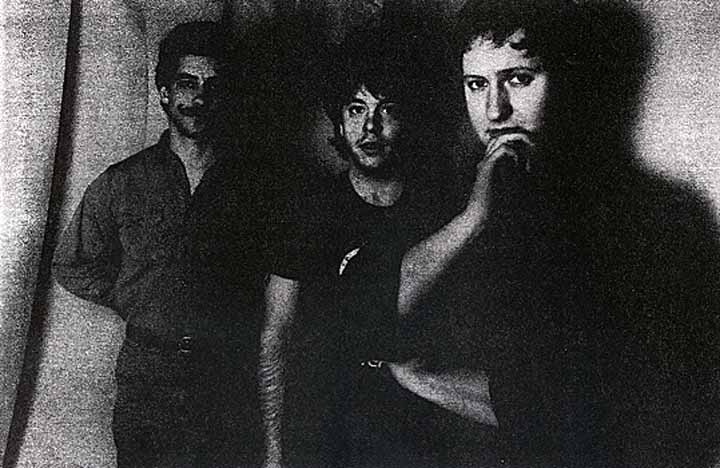
UF-I'M SURE IT'S AN OUTDATED QUES- TION, BUT YOU SAID YOU WEREN'T GOING TO GO WITH A MAJOR LABEL ? BOB-I don't think we ever said nev- er. A Couple years ago it didn't seem like it would be necessary. UF-I THINK IT WAS JUST SUGGESTED THAT YOU WOULDN'T IN MY LAST INTER- VIEW WITH YOU. BOB-It was suggested. We all sort of thought that way. I think part of it was that we really felt that way and aprt of it was when we knew we were going to, we didn't want people to know. GRANT-We were elusive for half a year. B-It saves a lot of questions by doing that. UF-DO YOU THINK YOU MIGHT HAVE SAID THAT JUST BECAUSE OF THAT ANTI- MAJOR LABEL ATTITUDE A LOT OF BANDS HAVE JUST TO KEEP WITH THE SCENE? G-We have resisted being a part of that. Maybe that's part of our im- portance to the scene. We've taken bold steps on our own, rather than depending on the cool factor to guide our movements. UF-WHY DIDN'T YOU GO WITH A DIVI- SION OF WARNER BROS., LIKE SIRE ? B-If you're gonna make the move, you might as well go with the parent corporation. UF-WAS IT YOUR CHOICE ? B-That was the obvious choice of all the labels that contacted us. UF-OBVIOUSLY YOU'VE HAD FREEDOM WITH WARNER BROS. WAS THAT HARD TO COME BY OR DID THEY JUST LET YOU DO WHAT YOU WANTED ? G-According to Karen, the A&R lady, every band that is willing to take the initiative has the similar freedom. I do think there's a lot of bands out there that need an intense amount of guidance with their career because they're insecure. B-It comes down to five things you need to work with a major label. You have to have a lawyer, which we have. You have to have an ac- countant, which we have. You have to have a booking agency, which we have and is our own. You have to have management, which is our own, and you have to have a producer, which is ourselves. So we have all five. UF-WAS THERE ANY PROBLEMS WITH THEM ? B-No. It took a lot of dialog. We didn't just say, "We want it all our way, and that's the way it's gonna be." They put out the records and do have some control, but they don't misrepresent the band. UF-DID THEY HAVE ANY SUGGESTIONS YOU DISAGREED WITH ? B-They disagreed on what the first single should've been. We stood
fast on that. We thought that going with "Sorry Somehow" as the first single, being the most obvious commercial track on the record, would've ben possibly a bad move at the time. A lot of people would have taken it the wrong way. Like "Oh yeah, there's the song they copped out on; that one's obviously the single...." It just happened to be the most commercial song on the record. It was gonna be commercial whether it was first or second. So to save people a lot of mental an- guish, we put it out second. UF-WHAT DOES WARNER BROS. THINK OF YOUR LIVE SHOWS ? G-You got to light a fire under these people, because in the ex- ample of SST, you're dealing with five or six people that are into your band anyway. A lot of times in a major record label, bands can be no more to John Doe than a poster on the wall or a tape in a box. You've got to excite these people with your music. You've got to get to know them and gain their re- spect and let them know they're more than just a record label to you. B-There's a lot of different people and a lot of different divisions and a lot of different titles these people hold, and they all play an intricate part of keeping it going. As opposed to an independent where it's four or five music fans. War- ner Bros. is made up of a number of music fans, but of different musical persuasions. Some people at a major label think that Van Halen is the best or that Whitney Houston is. It's not like SST where they like all of their bands. At a major label there's too many people for every- one to like every band on the label. UF-WHAT DOES YOUR CONTRACT STATE, AND WHAT DO THEY HAVE PLANNED FOR YOUR FUTURE ? B-We've got a second record coming out next year and after that I can't really say what's going on, 'cause I don't know myself. Probably renegotiate, I suppose. UF-HOW DOES IT FEEL TO BE SUCCESSFUL AND GAIN SOME COMMERCIAL RESPECT ? G-If you enjoy what you're doing, it's not really a feeling that changes. B-We don't have day jobs any more. We all had to have side jobs to get by, but we've always been serious enough that this is the way we wanted it to be. It's a twenty-four hour a day thing. G-We were serious enough that we would skip meals and skip some of the amenities. B-The people who yell "SELLOUT" or the people who yell, "They don't
deserve it." are crazy. Anybody who works hard enough will get what's coming to them. All these bands say they would never do it; if they could get the opportunity, they'd do it n a second. I don't believe a word of it. G-Not only that, but nobody ever asked us what it's like to be on food stamps back when. B-Nobody asked us what it's like to live in a basement for $70.00 a month with no heat or anything. UF-HOW LONG AGO WAS THIS ? B-Three years ago. It's not that dis- tant that we've forgotten. UF-SO IT COMES DOWN TO MONEY ? B-It comes down to, we did what we did our way. This is what we got from it and this is what we do for a living as well as for our life. UF-OBVIOUSLY SUCCESS HAS AFFECTED YOUR ATTITUDE, AS YOU LOOK BACK, BUT YOU DON'T SEEM TO DISCRIMINATE AGAINST HOW SMALL A PERSON IS IN THE MUSIC WORLD. B-Not at all. That doesn't change. The only thing that chages is your im- mediate reality, like realizing that this is the first year that you have to pay taxes in your life. Those are the things that change. You start going, "Oh shit, now I have to start paying the government for doing well." Money can't buy you everything, but it can certainly keep a roof over your head. UF-HAVE YOU HAD ANY INTERESTING EX- PERIENCES TOURING IN THE LAST FEW MONTHS SINCE YOU'VE BEEN ON WARNER BROS. ? B-We've only done two tours under the Warner Bros. blanket. One in England and one on the West Coast. The East Coast we did in February, right before the record came out. It wasn't supported in any way by the company. The tours aren't under- written by them anyway. It's just physical support, people showing up, or postering. We had a good time in England this time. Last time in Europe was so miserable. UF-ARE YOU PRETTY OPEN TO YOUR FANS ? B-We're pretty available over there. If people want to talk to us, they know where to find us. G-The best-distributed record over there was Land Speed Record up until the time Candy Apple Grey came out. So there's a lot of Euro- peans that thought we made a jump from Land Speed Record to this material. If people took the time to read when things were re- corded... B-Yeah, the difference between '81 and '86 is five years and ten rec- ords. That was an interesting situ- ation over there. A lot of the people had only heard Candy Apple Grey or only heard Land Speed Record.

